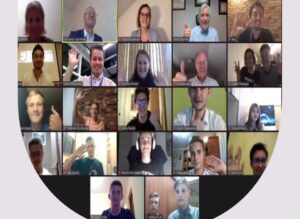Ukraine's students regularly bring home medals from international science competitions, and now they're also learning to put on their business thinking caps and turn their ideas into a commercially successful startup.
One of the entrepreneurship programs available to the country's school children is the Ukrainian Future (UF) Incubator of the Junior Academy of Sciences. Located in Kyiv, UF Incubator offers a variety of support, from short-term pre-incubation programs to longer startup schools.
In late August UF Incubator held an online pitch day for its summer residents. Eleven teams, ranging in age from 15-40, presented their projects to a group of experts from Ukraine, Poland and the US that included John DesRosier, USUF Biotech Initiative Advisor; Derek Eberhart, Executive Director of the UGA Innovation Gateway; and Rhonda Shrader, GIST Innovates Ukraine instructor.
Harmix™ - intelligent service that automatically selects music for your video
LEON – safe wireless quartz cleaning lamp
MilPriMaker - multi-functional machine
Chillinger - drink of your desired temperature in seconds, whenever and wherever
Agrodynamix - Radorod organic fertilizer and soil remediator
ProWir - wireless charging solution
Smart Box - smart refrigerator device
Nutis - automated nutrition and calorie counting device
Warm roof - thermal power generation, energy conservation system
Visible Space - 3D puzzle that helps visually impaired children and adults learn astronomy and biology
Engenius - predictive maintenance device
The teams received feedback on their business models and presentations along with prizes that included credits from Amazon Web Services and free access to the UF Incubator co-working space and prototyping laboratory. Agrodynamix will also receive support from the USUF Biotech Initiative.

*Junior Academy of Sciences of Ukraine under the auspices of UNESCO is a science educational system, which provides organization and coordination of research activities of school students, creates the conditions for their intellectual, mental and creative development as well as professional choice. It contributes to the increase of scientific potential of the country. 250, 000 children study annually in 65 scientific departments of the Academy.

